Subsidies paid to solar farms in the UK will come under review by ministers within weeks, Whitehall sources have told the Guardian.
There are around 200 solar photovoltaic farms around the UK, whose owners are paid thousands of pounds under the renewable obligation scheme. The payments are levied from household energy bills.
Solar farms have proven controversial in some individual cases, with a councillor in Devon likening them to concentration camps and comedian Griff Rhys Jones fighting a high-profile campaign against one outside Ipswich, but government polling shows it is one of the most popular energy technologies, with around 80% public support.
Payments are expected to be cut for the larger ground-mounted schemes that have been built on farmland, former airfields and other sites. "We don't want the whole solar sector damaged by a few solar farms that communities don't want," a Whitehall source told the Guardian.
Greg Barker, the climate minister, was reported by the Daily Mail as wanting to cut the payments. Barker, announcing the government's solar strategy earlier this month, told the Guardian: "I do not want solar farms to become the new onshore wind. I do not want to see unrestricted growth of solar farms in the British countryside."
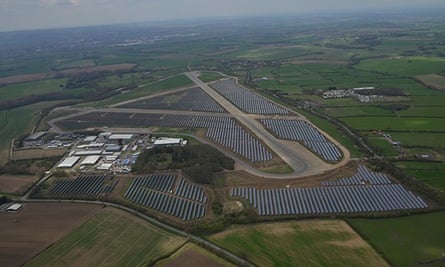
The government is understood to favour prioritising solar panels on buildings, such as factories and supermarkets. Building-mounted systems currently receive slightly higher payments (1.7 renewable obligation certificates per megwatt hour) than ground-mounted ones (1.6 ROC/mWh).
But the Guardian has been told that the "overall level of support for solar will stay the same", which could suggest the payments for solar on the ground will go down and those for panels on buildings will go up. A consultation will be announced within weeks.
The solar industry said it was disappointed by the prospect of a review.
Nick Boyle, CEO of Lightsource Renewable Energy, one of the UK's biggest solar developers, said: "The UK solar industry should be congratulated for its outstanding achievements in the first quarter of 2014, but instead we find ourselves having to justify our very existence. Solar installations are an asset to Britain and should be held up as a beacon of home grown electricity generation, but constant tariff cuts and government pressure act to undermine the work we do to provide clean, secure energy and put into serious question the very momentum we have worked so hard to build."
Friends of the Earth's energy campaigner Alasdair Cameron said: "Yet another badly handled review could spook investors and bring uncertainty to Britain's solar sector. Solar power is hugely popular and is on course to be one of our cheapest forms of energy, but it needs robust and predictable support to enable it to thrive and further reduce its costs."
Seb Berry, head of public affairs at Solarcentury, a major solar energy company, said: "It goes without saying that any move to change the renewable obligation from 2015 will have significant commercial consequences for this sector because of the long time-frame for large-scale projects. The truly nightmare scenario of a possible change to the RO before April 2015 would be a commercial disaster for the entire industry and certainly open up Decc [the Department of Energy and Climate Change] to the prospect of legal challenge."
On Wednesday, a report from the trade body the Renewable Energy Association said that the renewable energy industry, which also includes wind power, employs around 103,000 people, though the number marks a fall of around 7,000 since 2011.
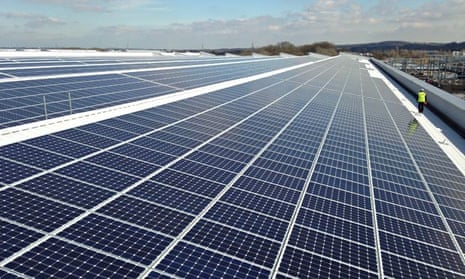
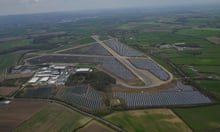
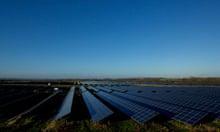
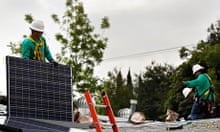
Comments (…)
Sign in or create your Guardian account to join the discussion